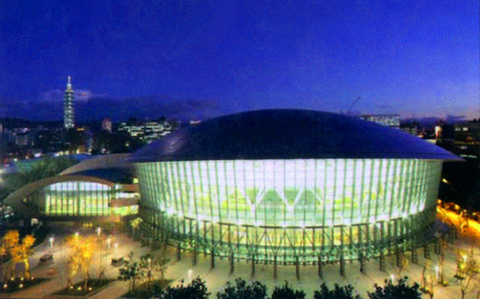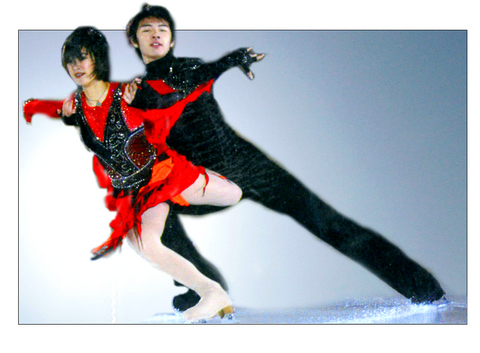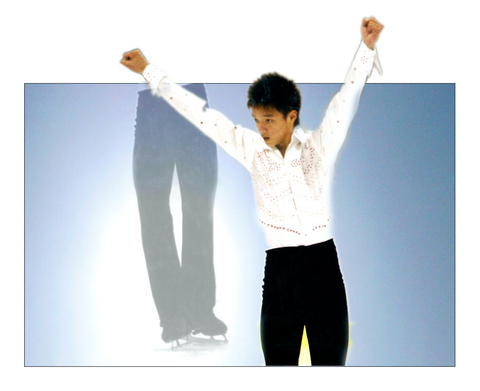Taipei 9am. Outside temperature: 27 degrees Celsius. People are mingling around the Taipei Arena in summer clothing drinking iced-coffee, as the tropical sun burns down from above. Inside, Joy Chang (張瓊文) has just skated off the ice after a grueling three-hour practice. The disparity between the sport taking place on the ice and the temperature outside is not lost on the other skaters who are changing out of shorts and t-shirts and into winter clothing to warm up for the Junior Grand Prix figure skating competition being held this weekend.
Over 200 skaters, coaches and judges from 19 nations will participate in the men, ladies, pairs and ice dancing competitions. Though individuals from Taiwan have competed in international competitions before, this is the first time that Taiwan will host an event of this stature.
Organized by the Chinese Taipei Skating Union under the authorization of the International Skating Union (ISU), this competition follows on the heels of the hugely successful Skate Asia 2004 competition, also held in Taipei, which saw 235 skaters from Taiwan compete against 425 skaters from five other countries.

PHOTOS COURTESY OF CHINESE TAIPEI SKATING UNION
Taiwan's roster of skaters for the Junior Grand Prix in the ladies competition includes Chang, Colleen Burkhead, and Jennie Lee (李國婕). The junior men's competition will only see one competitor, Tien Hung-wen (田宏文), who will be competing against some strong skaters from the US and Russia. The junior pairs will see the return of the brother-sister duo of Amanda Yang (楊雪芬) and Darryll Yang (楊周宏), who are flying in from California for the event. Taiwan will not be represented in the ice dance category.
Still in its infancy in Taiwan, there is no established figure skating team. The facilities in Taiwan are limited to two rinks, of which only the Taipei Arena has internationally standard ice facilities.
Taiwan has gained a lot of domestic support and international attention for sports such as taekwondo and archery, which are beginning to establish a solid tradition and infrastructure. However, for a country that hasn't even seen a qualifier for figure skating at the Olympics, let alone a medal, it's hardly surprising that many people on the island aren't that interested in the sport.

“We've had this ice rink for only a few years, so we don't have an ice-skating culture yet,” Chang said, who was a ballet and modern dancer before turning to figure skating.
Because the rink has only been around for a few years, a skating craze has yet to catch on in Taiwan. Yet, according to Rich Lee, secretary general of the Chinese Taipei Skating Union, the addition of the Taipei Arena to the city has done much to advance the profile of skating on the island, as Taiwan is now able to host international skating competitions.
“We promote skating in Taiwan by holding competitions such as this one right now and the 2004 Skating championships,” Lee said.

He added that this raises awareness of the sport causing young people to become more interested in figure skating. The Skating Union is also at the forefront in developing summer camps to encourage younger people to pick up the sport.
With only one professional-level rink in Taiwan, practicing is quite difficult, as figure skaters have to compete for ice time with other ice sports such as hockey.
“Right now, I've been given more ice time because of the Grand Prix, but during the rest of the year it's quite difficult to practice for longer than two hours,” Chang said.
This is in marked contrast to skaters from other countries in the competition who have established figure skating schools and practice regimens that average more than four hours per day.
“I'm the only one [in the ladies competition] that practices in Taiwan whereas the other [competitors from Taiwan] practice in California,” Chang said
Competitors from other countries also have the luxury of sports sponsorship — a luxury that pays for most of their equipment and ice time and allows them to compete around the world without incurring huge expenses.
As Chang has yet to find a sponsor, all her expenses are paid for by her parents.
The Junior Grand Prix is an important competition for any figure skater who has dreams of gold at the Olympics, as the ISU is the only sports federation for skating recognized by the International Olympic Committee (IOC). This means that figure skating competitions for the Olympic Winter Games (OWG) are the responsibility of the ISU in cooperation with the IOC. Additionally, only competitors from ISU Member countries — of which Taiwan is part, though going under the name Chinese, Taipei — may participate in the figure skating events at the OWG.
Taiwan is the seventh leg of the competition in a total of eight. The top eight contenders from each category will then compete in Sofia, Bulgaria for the finals. Competitors are allowed to compete in a maximum of two of the eight competitions.
For scoring, each maneuver — such as the triple axle jump — is given a pre-set base value, and the skater's ability or inability to execute that move may earn points or incur penalties, Chang said. The other component of scoring is a general appraisal of skating skills, choreography and interpretation.
Back at the Taipei Arena, Chang is concerned that her university teachers will discourage her from devoting a lot of her time to skating.
“In high school my teachers advised me not to become a skater. They think that athletes don't take their school work seriously,” Chang said.
Because Chang has to devote a considerable amount of time to school, she is unable to practice everyday. “But I always try to practice for at least one hour a day,” she said.
She added that it's as much a cultural as educational problem as many teachers perceive athletes as not being too concerned about their grades.
Because Chang had to sit for the entrance exam for university last year — she currently studies psychology at Fu Jen Catholic University — she didn't have a lot of time to compete and practice over the past year. Chang says that many teachers in Taiwan perceive skating and to a certain extent all sports to be more of an interest or a way to exercise, than as a physical pursuit to be taken seriously.
Looking to the future, Chang hopes to raise the profile of skating in Taiwan by passing it on to the next generation.
“I hope that if I have the chance, I'll be able to coach younger skaters to be as good as they can and perhaps compete at an international level like myself,” she said.
For your information:
What: ISU Junior Grand Prix of Figure Skating 2006/2007
Where: Taipei Arena (台北巨蛋), 2 Nanjing E Rd Sec 4, Taipei (台北市南京東路四段2號)
When:
Today
Ladies Short Program begins at 12:30pm.
Ice Dance — Original Dance begins at 5pm.
Men Free Skating will begin at 7pm followed by the Victory Ceremony for Men.
Tomorrow
Judges round table discussion of men's skating begins at 9am.
Ice Dance — Free Dance begins at 11:30am.
Pairs free skating at 1:45pm.
Ladies free skating at 4pm followed by victory ceremonies for Ice Dancing, Pairs and Ladies.
Judges round table discussion on Ice Dancing (TBA).
Award presentation and banquet at 9:30pm.
Sunday
Judges round table discussion on pairs at 8am.
Judges round table discussion on ladies at 9am.
Admission: Tickets for the events are free and available at the Taipei Arena

April 14 to April 20 In March 1947, Sising Katadrepan urged the government to drop the “high mountain people” (高山族) designation for Indigenous Taiwanese and refer to them as “Taiwan people” (台灣族). He considered the term derogatory, arguing that it made them sound like animals. The Taiwan Provincial Government agreed to stop using the term, stating that Indigenous Taiwanese suffered all sorts of discrimination and oppression under the Japanese and were forced to live in the mountains as outsiders to society. Now, under the new regime, they would be seen as equals, thus they should be henceforth

Last week, the the National Immigration Agency (NIA) told the legislature that more than 10,000 naturalized Taiwanese citizens from the People’s Republic of China (PRC) risked having their citizenship revoked if they failed to provide proof that they had renounced their Chinese household registration within the next three months. Renunciation is required under the Act Governing Relations Between the People of the Taiwan Area and the Mainland Area (臺灣地區與大陸地區人民關係條例), as amended in 2004, though it was only a legal requirement after 2000. Prior to that, it had been only an administrative requirement since the Nationality Act (國籍法) was established in

With over 80 works on display, this is Louise Bourgeois’ first solo show in Taiwan. Visitors are invited to traverse her world of love and hate, vengeance and acceptance, trauma and reconciliation. Dominating the entrance, the nine-foot-tall Crouching Spider (2003) greets visitors. The creature looms behind the glass facade, symbolic protector and gatekeeper to the intimate journey ahead. Bourgeois, best known for her giant spider sculptures, is one of the most influential artist of the twentieth century. Blending vulnerability and defiance through themes of sexuality, trauma and identity, her work reshaped the landscape of contemporary art with fearless honesty. “People are influenced by

The remains of this Japanese-era trail designed to protect the camphor industry make for a scenic day-hike, a fascinating overnight hike or a challenging multi-day adventure Maolin District (茂林) in Kaohsiung is well known for beautiful roadside scenery, waterfalls, the annual butterfly migration and indigenous culture. A lesser known but worthwhile destination here lies along the very top of the valley: the Liugui Security Path (六龜警備道). This relic of the Japanese era once isolated the Maolin valley from the outside world but now serves to draw tourists in. The path originally ran for about 50km, but not all of this trail is still easily walkable. The nicest section for a simple day hike is the heavily trafficked southern section above Maolin and Wanshan (萬山) villages. Remains of